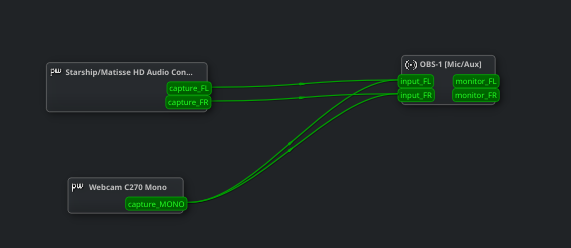My partner and I are running Manjaro and very new to it. Trying to switch as much as possible over to daily use with Manjaro. We have pipewire, not pulseaudio
We record multiple times a week on OBS, and my partner and I are in the same room. We have two mics side by side both inputs going into my PC. Linux, and therefore OBS, are recognizing the two mic inputs separately as you might expect.
OBS can set up both of these separate inputs, but the issue is we’re having significant problems with echo and the noise suppression/noise gates are not sufficient.
This was not an issue on windows, where we used Voicemeeter to combine our inputs into one mic for OBS. I am looking to emulate that on Linux to see if it solves our problems.
We have tried a mic merge sink, but it creates an OUTPUT device, not an input device.
SOLUTION: QPWGraph was the answer (or something like it, Helvum was also recommended) While it looks intimidating at first you just need to understand it’s a series of outputs and inputs and you play mix and match. This allowed us to take the outputs of the mics and connect them directly to a single OBS mic source. This 100% did all that Voicemeeter was doing for us, and the results were also the same.
We do not experience echo, overlap, feedback, or any of the issues we were having by adding the two mics separately in OBS. Our issue was NOT the setup, as some people focused on here. As soon as we got the mics going into that same input, all was good and we successfully ran a recording session 100% in Manjaro.
In the end, this did everything we wanted from Voicemeeter + MORE, as I can now isolate different outputs as well. So for instance in recordings I can manage the volume of discord and the background music separately. So this was an amazing solution and the result was exactly what was needed, and ultimately was much easier than Voicemeeter.
Thank you to those here that recommended it, and the people at the Manjaro forums.
I’ve just created an OBS audio capture device, then opened qpwgraph and put both mic’s into it.
It should do what you want, but I am not sure that will fix the problem. Give it a shot and let us know.

I definitely recommend playing around with easyeffects a bit more as well.
This was the solution, thank you!
100% what worked for us, and I got the recommendation from Manjaro forums as well. Thank you!
Never done anything with 2 mics, so I’ll just throw a vague suggestion: there’s Helvum to combine the mic inputs and then Easy Effects that can apply a few noise suppression filters that can do world of a difference, maybe the first isn’t even necessary, while the second is the core and can be tweaked a lot
Try using audacity/tenacity with each mic on one stereo channel, press recording and link the output to OBS.
It sounds like your issue is that each microphone is picking up the other person’s voice. If your software is insufficient to handle this, I’d move or change the microphones.
We have a setup that works fine with Windows, so I refuse accept that we cannot make it work the same way with Linux. I feel like a lot of people here are not focusing on the main questions we had about how we can achieve a goal.
We figured out how to merge the mic inputs into a single sink, but it’s an output. We used this post to achieve it. This helps us, and works for Discord. On Discord the echo is not a problem, but it’s using the built in Krisp to do noise suppression, so that might be part of it.
On Windows, as described in OP, we used VoiceMeteer to combine the inputs. It’s possible this was achieving some kind of noise suppression too, but I don’t see how or why that would be the case. Either way, in Windows, there is no echo problem. We use the same exact setup to be on Discord and record our inputs through OBS without any echo.
deleted by creator
You’re right, that would help. I am not 100% sure that it was not applying some kind of echo/noise filtering. If you’re aware of any software that can do this on linux, we will try that.
spoiler
safsafsfsafs
That’s not true, our phones, ms teams, discord, etc do this real time all the time. Audio isolation is one of the most widespread audio processing.
deleted by creator
I can think of some commercial audio processors that can help with that, but they are super pricey.
I can’t think of a linux application that has this capability. If there is something out there that offers AEC (acoustic echo cancellation) on linux with two mic inputs, id also be interested.
One way to help with this as far as inexpensive hardware is to make sure you’re using cardioid dynamic microphones, and not omnidirectional condenser microphones. Cardioid dynamic mics generally pick up audio directionally, like from the “front”. You have to be right up on the mic in order to have it record any type of audio. They generally wont pick up environmental sound from anything more than a few feet away. You can just point them away from noise you don’t want to pick up.
Yes, I’m sure there are multiple professional software solutions that are expensive but can do it. Reconfiguring the equipment is much cheaper.
Even basic stuff like teleconferencing software can do it, like do y that when Zoom is playing audio it doesn’t pick it back up through a desk mic, unless the feedback is really bad.
deleted by creator
The room is not professionally treated for sound, but we do have one wall (behind the mics) 90% covered with 2" sound dampening foam. Lots of stuff on the other walls, rugs, etc. It is not a bare-bones room. Our mics are good quality cardioid mics and while our setups are not 180° back-to-back, the mics point away from each other when in use. I don’t know if I can explain well enough with words, but we sit side-by-side with the mics between us on arms. They swing down between us, stretch out towards us, and point away from each other. They are about 1.5 to 2 feet apart from each other, pointed away, when in use.
deleted by creator
Hey, thought you might want to just know, or for the sake of anyone else find this in the future, there are software solutions. Multiple in fact. Solution on the post. Worked perfect, not echo/bleed whatever you want to call it. It was, in fact, nothing to do with the setup of our rooms and mics.
deleted by creator
I think you really took it harder than you needed to, holy… Maybe read it through again? Seems like you posted that in a bad state. Hopefully you’re in a better state now. I really mean that.
deleted by creator
deleted by creator
No this is not our issue, but thanks for the responses.
We have excellent mics and set up, and we run this set up for years just fine on windows. So all the assistance I am looking for is how to combine our inputs into one on Manjaro.
My partner’s other post says more which I might as well not repeat: https://sh.itjust.works/post/40171565/19201729
deleted by creator
A software solution is fine for us. We cannot change mic arrangement any more than it already is due to physical restraints in room. The mics are faced away from each other. They are good quality XLR mics and run through a Focusrite Scarlett 2i2.
You were depending on heavy real time post processing in software
Are you talking about Voicemeteer?
what are you recording for
We play TTRPGs online via Discord and FoundryVTT, and record the sessions. We use OBS to capture webcams on Discord, the virutal tabletop, desktop audio for other people’s voices/music from the vtt, and mic audio for our voices.
On Windows, we used Voicemeteer to combine our mics. We could use this resulting combination for both OBS and Discord. Since we cannot find similar software so far for linux, we came across the solution I linked above. It works for getting our mics to be combined into one for Discord, but doesn’t show up as an input in OBS. We cannot get OBS to “listen to” the combined sink output.
So, instead, we just set them up as two different mics in OBS. This would be fine, except the recording as the echo problem. Over Discord, I assume because it’s getting Krisp noise suppression applied, there is no echo. But after listening to the OBS recording, there is echo. So, a software solution to noise/echo suppress might be what we need as well, but that’s why we’re asking for help.
deleted by creator
Voicemeteer also seems to be a mystery to y’all.
I don’t appreciate your condescending tone, tbh. If you are not interested in helping us, you can stop replying.
Voicemeteer was taking our two mics and turning them into a single source that we could then feed to Discord and OBS. That should be it. I’m not completely sure it wasn’t applying some other kind of filters, but I don’t think it was, that’s not what it’s supposed to do. So let’s say we have Mic Source 1 and Mic Source 2. Voicemeteer took the input from both of those and combined them into Combined Source. We then pointed OBS and Discord to use Combined Source. That’s all we’re trying to achieve on Linux right now.
Krisp is a feature of Discord. It is available on Linux. We have used this post to accomplish what we want to do with Discord, but this solution does not work for OBS. On Discord, others on call do not report hearing this echo effect. It only appears in OBS recording when we use Mic Source 1 and Mic Source 2. I am not convinced that Krisp is a factor here, as we have tested with it off, but I felt it was worth mentioning. It seems to have confused the situation though.
deleted by creator
Hi, for what it’s worth, as someone who’s a spectator to all this, I both appreciate the technical advice that you have been giving out and thought your comments came across as somewhat condescending and irritating.
(reposting this in a higher comment for other people to potentially see)
Y’all need carpet on the floors, maybe something on the walls, and to be facing each other from across the table with cardiod mics.
The room is not professionally treated for sound, but we do have one wall (behind the mics) 90% covered with 2" sound dampening foam. Lots of stuff on the other walls, rugs, etc. It is not a bare-bones room. Our mics are good quality cardioid mics and while our setups are not 180° back-to-back, the mics point away from each other when in use. I don’t know if I can explain well enough with words, but we sit side-by-side with the mics between us on arms. They swing down between us, stretch out towards us, and point away from each other. They are about 1.5 to 2 feet apart from each other, pointed away, when in use.
We bypass the issue. We use DJI mini mics, which allow you to connect multiple mics to a single base receiver, and that receiver appears as a stereo sound source.
There should be a software solution to this.




